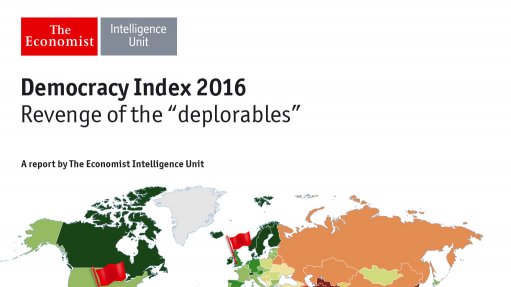
The Economist Intelligence Unit’s Democracy Index provides a snapshot of the state of democracy worldwide for 165 independent states and two territories. This covers almost the entire population of the world and the vast majority of the world’s states (microstates are excluded).
The Democracy Index is based on five categories: electoral process and pluralism; civil liberties; the functioning of government; political participation; and political culture. Based on their scores on a range of indicators within these categories, each country is then itself classified as one of four types of regime: “full democracy”; “flawed democracy”; “hybrid regime”; and “authoritarian regime”. A full methodology and explanations can be found in the Appendix.
This is the ninth edition of the Democracy Index. It records how global democracy fared in 2016. The title of this year’s report refers to the popular revolt in 2016 against political elites who are perceived by many to be out of touch and failing to represent the interests of ordinary people (“political elites” refers primarily to governments, legislatures, state institutions and political parties, though it also encompasses the media, expert bodies and international organisations).
It was a revolt that was foretold in recent editions of the Democracy Index, which have focused on the growing disconnect between political elites and the people that is particularly evident in the world’s most mature democracies. The UK’s vote in June 2016 to leave the EU (Brexit) and the election of Donald Trump as US president in November 2016 sent shock waves around the globe. Both were an expression of deep popular dissatisfaction with the status quo and of a hankering for change.
Report by The Economist